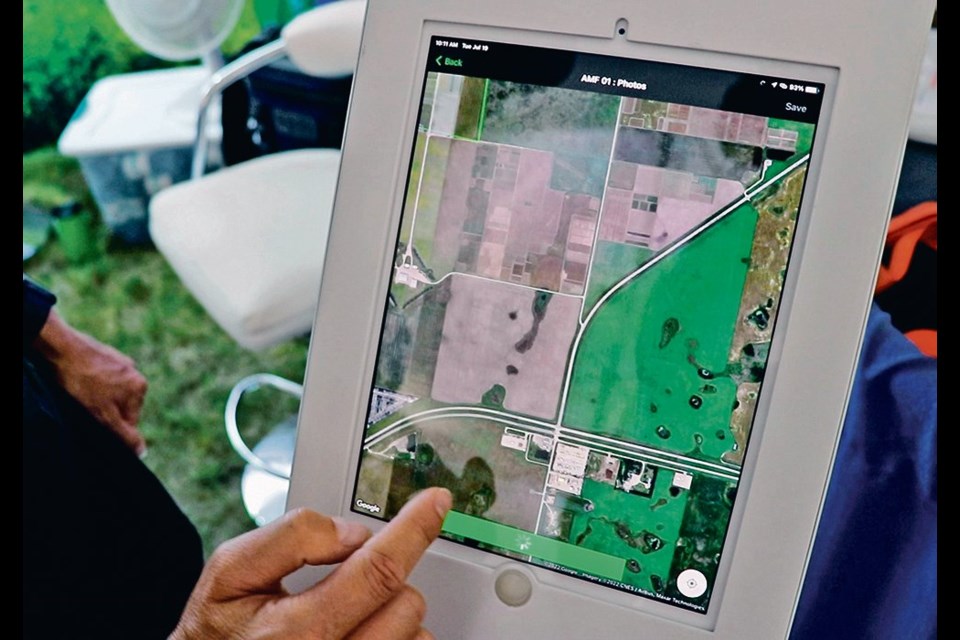LANGHAM, Sask. — Sending agronomic reports to customers used to be an onerous task for Kara Annand, who is an owner of Ag Grow Consulting of Nipawin, Sask.
So, the company hired a developer to build a cloud-based app called AgScouter to help its agronomists efficiently take and send in field reports to customers.
“It’s an agronomy scouting app for agronomists to use in the field that helps keep track of your recommendations, your observations and it connects you quickly with your grower,” Annand said in the Ag Grow Consulting booth at the Ag In Motion outdoor farm show held July 19-21 near Saskatoon.
When an agronomist opens the app, they can choose the field they’re working on by touching it on the map, or by choosing it from a field list.
Once the field is chosen its history is available including crop rotations, applied products and previous notes and observations.
Users will then input new observations to add to the field’s data, including the weed types and their growth stage, crop staging, and observations on pests.
Agronomists can also add a pin on the map where their observations occurred in the field, including where photos and soil samples were taken.
There’s a dropdown list in the app of crop stages, diseases, insects and weeds for agronomists to choose from.
“So, if I’m out in a field and I notice a patch of cutworms out there I can also mark it, drop a pin and take a picture of that area,” Annand said.
“I can also add some notes and save that, so I’ll say cutworm patch and it will record that and there is also a GPS reference. So, if I’m coming back next week, I can go back to that same area and see what’s going on.”
AgScouter has a feature that enables agronomists to quickly connect with a grower if action needs to be taken immediately, including if the scouting revealed a field should receive a pesticide or in-crop herbicide application as soon as possible.
“I can put a few notes in here. If I wanted, I can also add the water volume and I can also put if it’s a residual concern and it’s going to notify me the next time I go in here,” Annand said.
There’s another dropdown menu of product recommendations from AgScouter’s annually updated database.
Once a crop is chosen for a field the dropdown menus will only include herbicides that work with the crop, along with predetermined rates.
“So, if you have some junior agronomist working with you or other agronomists that may be a little less experienced, there’s no way that they can choose a product that’s not correct for that crop,” Annand said.
AgScouter also has a feature where directions to fields are easily accessible.
“If you’ve got some hired hands working on your farm or maybe some new agronomists you hit directions, it’s going to take you to the field,” Annand said.
When it comes time to make a report for the farmer, agronomists choose which observations, recommendations and images they want to include. The app will then text or email a PDF version of the report to the grower.
Annand said all the information collected in the app is private, and it is not shared without the consent of the growers.
“The farmers sign a contract right with us, and that data is not shared with anybody else. That’s their data,” Annand said.
There are a few price points for agronomists that want to use the app.
There’s also a farmer version of the AgScouter app that costs $300 per year for a grower to use, that has access to a database of leading agronomy products and crop varieties.
This version also keeps track of the fertility program including soil tests, applied products and recommendations.
It has a field observations dropdown list with crop stages, diseases, insects, weeds and the ability to add photos and notes.
The grower version also has a product recommendation dropdown menu with spraying recommendations from AgScouter’s annually updated database.




